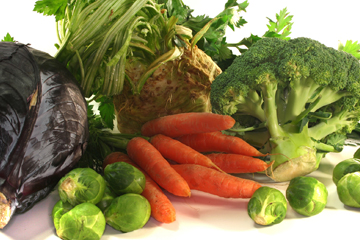Seasonal vegetables contain ingredients that suit the body’s needs for that time of the year. Winter vegetables provide essential vitamins, minerals, and nutrients and help boost immunity. According to Health line, these cold-hardy winter vegetables can withstand frosty temperatures due to the higher amount of sugar that they contain. The sugar found in the water of winter vegetables causes them to freeze at a lower point, which allows them to survive in cold weather. Here are 8 healthy winter vegetables that you should include in your diet:
- Dark leafy greens: Kale, Swiss chard and green collards flourish in the cold weather and are rich in vitamins A, C and K. Collards, mustard greens and escarole are also excellent sources of folate, important for women of childbearing age. Frost can take away the bitterness of kale, one of the healthiest vegetables in the nutrient-rich cruciferous vegetable family.
- Brussels sprouts: Another member of the nutrient-rich cruciferous vegetable family, Brussels sprouts are packed with vitamins, minerals, nutrients and especially an excellent source of vitamin K, which is critical for bone and heart health, as well as brain function. Additionally, Brussels sprouts are high in fiber and alpha-lipoic acid, both of which can keep blood sugar levels stable and benefit people with diabetes.
- Carrots: Carrots flourish in winter months. Carrots are packed with vitamin A (essential for eye health and also important for immune function and proper growth and development) and powerful antioxidants that may help protect against certain diseases like prostate and breast cancer.
- Parsnips: Parsnips are an excellent source of vitamins B and E, potassium, magnesium and manganese. They also grow sweeter as frigid temperatures set in, making them a delightful addition to winter dishes. They have a slightly earthy taste and are highly nutritious.
- Winter squash: A quintessential fall vegetable, winter squash refers to a group of richly colored vegetable that have high levels of carotenes, vitamin B1, vitamin C, pantothenic acid, folic acid, potassium and fiber. There are many varieties of winter squash such as butternut, pumpkin, acorn, delicata and spaghetti squash, and all are excellent choices in the winter. These vegetables can help protect the body from heart disease, cancer and diabetes.
- Rutabagas: This root vegetable is a rich source of vitamin C and potassium. All parts of the rutabaga plant can be eaten, including the leafy green tops that stick up from the ground.
- Artichokes: Low in fat, artichokes are high in fiber, and loaded with vitamins and minerals like vitamin C, vitamin K, folate, phosphorus, and magnesium.
- Sweet potatoes: Loaded with fiber, beta-carotene, vitamins A, B6 and C, and antioxidants, sweet potatoes help prevent flu viruses and common colds and also aid in the formation of blood cells.
Winter vegetables are flavorful, nutritious and comforting. Adding fresh, seasonal produce to your diet will go a long way towards promoting your health.
